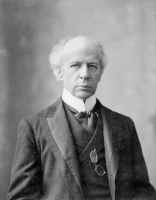| |||||||
Sir Henri Charles Wilfrid Laurier GCMG, PC, KC (/ˈlɒrieɪ/ LORR-ee-ay; French: [wilfʁid loʁje]; 20 November 1841 – 17 February 1919) was a Canadian politician and statesman who served as the seventh prime minister of Canada, in office from 11 July 1896 to 6 October 1911.
Laurier is often considered one of the country's greatest statesmen. He is well-known for his policies of conciliation, expanding Confederation, and compromise between French and English Canada. His vision for Canada was a land of individual liberty and decentralized federalism. He also argued for an English–French partnership in Canada. "I have had before me as a pillar of fire," he said, "a policy of true Canadianism, of moderation, of reconciliation." He passionately defended individual liberty, "Canada is free and freedom is its nationality," and "Nothing will prevent me from continuing my task of preserving at all cost our civil liberty." Laurier was also well-regarded for his efforts to establish Canada as an autonomous country within the British Empire, and he supported the continuation of the Empire if it was based on "absolute liberty political and commercial". In addition, he was a strict nationalist, argued for a more competitive Canada through limited government, and was an adherent of fiscal discipline. A 2011 Maclean's historical ranking of the Prime Ministers placed Laurier first.
Canada's first francophone prime minister, Laurier holds a number of records. He is tied with Sir John A. Macdonald for the most consecutive federal elections won (four), and his 15-year tenure remains the longest unbroken term of office among prime ministers. In addition, his nearly 45 years (1874–1919) of service in the House of Commons is a record for that house. At 31 years, 8 months, Laurier was the longest-serving leader of a major Canadian political party, surpassing William Lyon Mackenzie King by over two years. Along with King, he also holds the distinction of serving as Prime Minister during the reigns of three Canadian Monarchs. Finally, he is the fourth-longest serving Prime Minister of Canada, behind King, Macdonald, and Pierre Trudeau. Laurier's portrait has been displayed on the Canadian five-dollar note since 1972.
| << 前一君主: chá 'ěr sī · tǎ pò jué shì | lián bāng de zǔ chéng jí kuò zhāngwēi 'ěr fú lǐ dé · láo léi 'ěr jué shì Sir Wilfrid Laurier (1896年~1911年) | 后一君主 >>: luó bó tè · lāi 'ěr dé · bó dēng jué shì |
